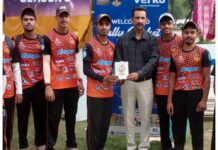Workshop on Crop Residue Management in Panjab University
Centre for Human Rights and Duties, Panjab University, Chandigarh in collaboration with the Department of Agriculture and Farmers Welfare, Haryana organized a dissemination cum consultation Workshop on “Crop Residue Management in India: Strategies and Challenges” on May 4, 2022, at ICSSR Seminar Hall, Panjab University, Chandigarh. The workshop was part of the project sanctioned to Dr. Namita Gupta along with Dr. Monika Munjial Singh by Department of Agriculture, Haryana titled “Socio-Economic Impacts of Stubble Burning in Sirsa and Fatehabad Districts of Haryana”.
Dr. Namita Gupta(Principal Investigator of the Project and Associate Professor, Centre for Human Rights and Duties while briefing the outcomes of the project stated various issues related to happy seeders in the fields. She also gave a list of recommendation from the field to make in-situ management possible.
Sh Devinder Sharma, Agricultural Scientist and Food and Trade Policy Analyst was inaugural speaker who focused on making agriculture sustainable globally as well as nationally. He said that earthworms have disappeared due to an increase in the pH level of soil. Studies of ARI also reveal that countries like Indonesia, Vietnam and Philippines produce more crops without using pesticides and chemical fertilizers. Therefore, farmers should sustainably use pesticides. Still 42 pesticides are used in Punjab and Haryana. Another study also reveals that about 47-59% Green-house gases emitted from agriculture and practice of intensive farming leads to climate change. He stated that today’s World Economic Design is basically focuses on preventing farmers from doing agriculture and Indian farmers’ situations have become like the Abhimanyu of Mahabharat. Moreover, they are seen as the villain who create pollution in the environment
Prof. (Dr.) Adarsh Pal Vig, Chairman, Punjab Pollution Control Board, Punjab stated that Zero cost technology like vermicomposting and solid waste management practices should be applied in agriculture. Stubble should be used as a source by Industries because coal becomes expensive day by day. He also said that insects like earthworms living in soil should not be killed because they automatically increase the productivity of crops because they are natural fertilizers and farmers’ friend and Earth’s intestine. But due to use of pesticides earthworms have lost and marketing of machines is also a contributing factor in this.
Sh Hardeep Kadian IAS, Director General, Department of Agriculture and Farmers Welfare, Haryana who stressed upon the need of both In-situ and Ex-Situ management for preventing stubble burning. He said that farmers should replace Non-Basmati rice with Basmati rice variety because basmati stubble can be used as fodder for animals because of its low silica content and farmers should use decomposers on stubble. The government also banned the PUSA-44 variety of rice. DSR technique should be used by farmers for paddy cultivation because it saves about 25 % water. The Haryana Government is also providing 50 % subsidy to individual farmers and 80% subsidy to group farmers for purchasing machinery for stubble management. The next plan of the Department of Agriculture and Farmers Welfare, Haryana is to provide 1000 rupees per hectare to farmers for bailing and engaging.
Vote of Thanks was delivered by Dr. Upneet Kaur Mangat, Chairperson, Centre for Human Rights and Duties, Panjab University.
The workshop further had two Technical Sessions. Technical session I was on the topic “Use of Crop Residue for Generation of Energy and Curbing Air Pollution”. The panelists for the session were Dr. Jagir Singh Samra, Senior Advisor, Renewable Energy Programme, CRRID, Chandigarh; Prof. (Dr.) Ravindra Khaiwal, Professor of Environment Health, PGIMER, Chandigarh; Dr. Anil Sood, Head, ACM Division at Punjab Remote Sensing Centre, Ludhiana and Sh. Sanjeev Sharma, General Manager, Engg and Utilities, YCD Industries Limited, Mohali.
Technical Session II was on “Crop Residue Management: Civil Society’s Intervention”. The panelists for the session were Sh. B.S Khadda, Deputy Director (Training), Krishi Kissan Kendra, SAS Nagar, Punjab; Sh. Ajai Malik, Program Manager, Indian Paryavaran Sahayak Foundation, New Delhi; Dr. Monika Munjial Singh, Co-Investigator of the Project and Professor in the Centre for Social Work, Panjab University; Dr. Jaskaran Singh Waraich, Practicing Farming and Chairperson, Department of Defence and National Security Studies, Panjab University and Sh. Umendra Dutt, founder and Executive Director, Kheti Virast Mission.
The workshop was attended by the farmers from Punajb and Haryana as well as by the field officers from various districts of Haryana. The workshop was culminated with a note that more such workshops would be conducted in the coming months in the various districts of Haryana.














